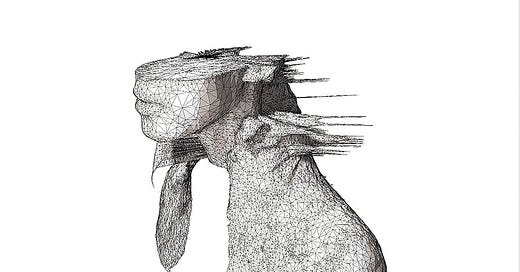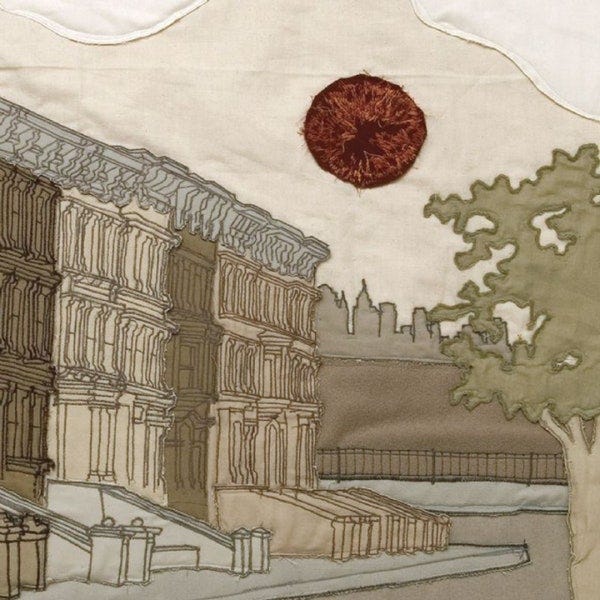And you came along and you cut me loose
Coldplay - 'Amsterdam' (A Rush Of Blood To The Head - 2002)
Twenty-one years ago this week, I was just about to start University. Like any first-year student at a British university, it was a week of awkward introductions and the same three questions for anyone who stood next to you for more than a minute - Where are you from? What A-levels did you do? What subject are you studying? It’s a week of unpacking a new version of you into a new location. The posters you bring with you to hang on the wall, at the time, for me, it was the embryonic DVD and CD collections I had brought with me - I couldn’t take all of both, so some self-selection had to happen in the same way. I wonder if the version of me from 2007, 2012 or 2017 would have taken the same albums and DVDs from that same 2002 collection I had - almost certainly not as tastes change and can surprise - as anyone who got into The Sizzler flavour of Pot Noodles that year will tell you. So what was soon-to-be nineteen-year-old me taking to start a new phase in my life?
That summer, I had been listening to 2002 albums such as The Last Broadcast by Doves, The Flaming Lips’ Yoshimi Battles The Pink Robots, The Coral by The Coral, Heathen Chemistry by Oasis, Highly Evolved by The Vines and Badly Drawn Boy’s About A Boy OST. I’d also been listening to a fair amount of Neil Young (Decade and Everybody Knows This Is Nowhere). In my first year, people around me were keen on new albums by Queens of The Stone Age1, Foo Fighters and Red Hot Chilli Peppers. That autumn, I received compilations from the likes of Ash, The Who, U2, and The Rolling Stones for my birthday; I picked up albums like The Private Press by DJ Shadow and 2 Many DJs that would start to expand my palate outwards.
The three things that I played the most that first term, though, especially on my CD Walkman on the way to lectures, were the remaining studio albums by The Beatles I didn’t own (the early ones), Beck’s Sea Change - which will always remind me of that time of my life and Coldplay’s A Rush of Blood To The Head, because it felt like a bridge back to home.
Fans of listening to a full studio album on a CD player while on the go will know that, as well as the inevitable motion-based skips, despite what the sticker on the box says, the album finish might mean a hidden track. Indeed, there is one on Coldplay’s first album, Parachutes. Knowing that you didn’t have to listen to minute-upon-minute silence to reach the end (in fairness, the gap is seconds on Parachutes) is all the more satisfying on a Walkman.
Listening to AROBTTH at the time, I didn’t know as not all the singles had been chosen, but now, the record feels very front-loaded. ‘In My Place’ was the first single before the album, but ‘The Scientist’ and ‘Clocks’ would push their amount of radio play in the UK beyond occasional daytime BBC Radio 1 to Capital.FM playlist rotation in 2003. Looking at Setlist.fm, the first five songs on the record are all in the top 8 songs they’ve ever played live, and the next six are languishing outside of the top 25. To hammer this point home, the first five songs have been played live2 3,734 times, the next six only 673.
Within the album's context, ‘Amsterdam’ serves as a poignant conclusion to an album of songs that explore themes of love and despair - much like their debut, but also a nod to socio-political anxieties, which eventually brings us to whatever you want to call this.
The song starts softly with Chris Martin's emotive, honey-soaked vocals backed by subdued instrumentation. The piano's melancholy in the opening seconds sets a reflective tone supported by an equally poignant melody. Jonny Buckland's guitar work, Guy Berryman's bass, and Will Champion's drums follow suit, adding layers to the complexity of the track. As the song progresses, the music escalates, transforming from an understated melancholic tune to an anthem of sorts. This format has become a Coldplay trademark where the song builds for about three and a half minutes, explodes and shines for a minute and a half before resolving to where the music began. It is a lovely motif and one I believe the band have admitted that “going back to the start” isn’t just a lyric from ‘The Scientist’ but a nod to The Flaming Lips song ‘The Spark That Bled’ from 1999’s The Soft Bulletin, a record that would have felt like a set text to the band in their university days.
Lyrically, ‘Amsterdam’ is paved with metaphors and symbolism. The lyrics hint at regret, perhaps a missed opportunity or, everyone’s favourite thing to dwell on, an irreversible mistake. While the song explores themes of emotional struggle, it is generally understood not to be an interpretation of self-harm or life-ending actions. By all accounts, it is named after the city in which it was written and nothing more.
‘Amsterdam’ serves as a form of resolution within A Rush of Blood to the Head. It echoes the sentiments expressed throughout the album, dealing with life's transience, societal flaws, and personal relationships - and builds upon them, ending with a crescendo that delivers both closure and an emotional release. It’s a farewell and an invitation to start again and listen anew. In that sense, it has a role in serving as a conclusion while simultaneously inviting listeners to revisit the experience it concludes.
The Run Out Grooves Infinite Loops
Here’s an album that bookended the other end of my time at university - 32 or so months seemed an age at the time!
The city's cemetery's humming
It’s another visit to 2005… In the middle of the first decade of the 21st century, was the first time the ability for the sound and culture of indie rock to spread across America with fewer confines to any specific geographical location. This was a new phenomenon for the North American music scene. Previously, musical movements had been intrinsically tied…
This included me.
As of 25th Sept 2023






Love Amsterdam. At the time I was watching a lot of contemporary dance and it seemed a song lending itself well to physical expression. Even more so than the instrument backing, the lyrics and vocals themselves carried it.
It was the type of track that I’d skip over to hear the other hits, then while distracted, let it play one day. It was a favorite after that point. Another is “Daylight”. It’s great harmonizing with the vocals.